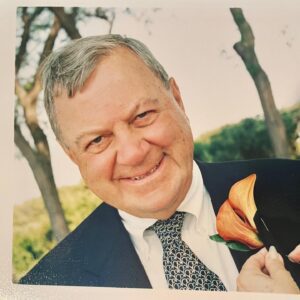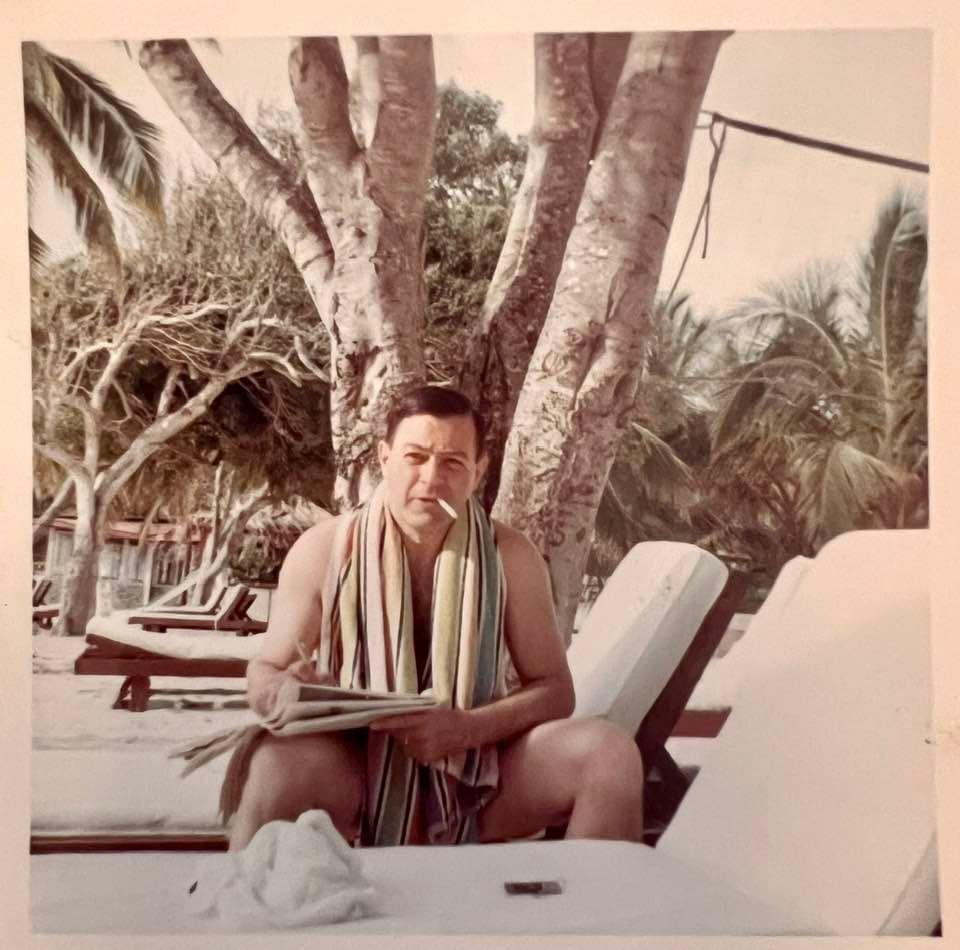
07 Oct Carmen Seminara Obituary (1932-2024)
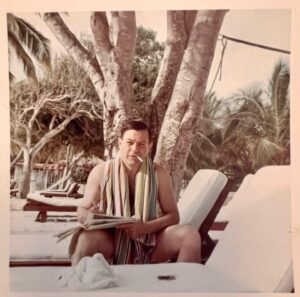
My father wasn’t a rich or famous man, but he was a celebrity to all who knew and loved him. Handsome, charming and ever-optimistic, Carmen was a family man, a salesman, a traveler, a gambler, and a storyteller par excellence. He appreciated a good challenge and enjoyed few things more than getting upgrades. Everyone he loved recalls his unique embrace. Carmen would place both his hands over your ears with open palms, train his baby blue eyes on you and draw your forehead flush to his to express love, appreciation or to punctuate a story. If you were in Carmen Seminara’s loving orbit, he reveled in your triumphs and experienced the pain of your failures as though they were his own.
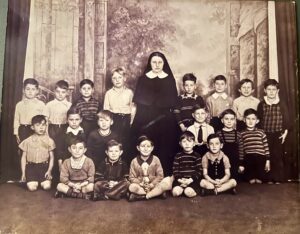
Niagara Falls
Carmen Julius Seminara was born in Niagara Falls on September 22nd, 1932. He was the 9th and final child of Carmelo and Antonietta, Sicilian immigrants who came to America seeking prosperity on the SS Venezia in 1911. They nicknamed him Carminuze and Laura, the second oldest, gave him the middle name Julius because she was convinced he was destined to be a great man, like Julius Caesar. It was the Great Depression, and times were tough in the Falls’ Little Italy neighborhood where he grew up. The average hourly wage in the country was just 38 cents an hour–down sharply from the better times of the Roaring 20’s.
Antonietta died of a gallbladder rupture when Carmen was 8 years old. Carmelo had little formal education, but he worked hard to support his family, toiling for years as a maintenance man and janitor at St. Mary’s Hospital. He had five sisters who spoiled him. One year, when he needed money to go on a class trip to Washington, D.C., his sister Roz took out a loan to help him get there.
They lived on 14th street, close enough to DiCamillo’s bakery to smell the bread, and later on 15th street within walking distance of St. Joseph’s, where he was baptized. Carmen frequently recalled that his father used to try to find bruised apples at the market and would use those imperfections as leverage to haggle with the vendors for a lower price. One day, when little Carminuze objected to his father’s haggling and suggested they simply pay the full price for flawless apples, Carmelo kicked him in the ass and reminded him how poor they were and how hard he worked to feed their big family. It was a lesson he’d never forget.
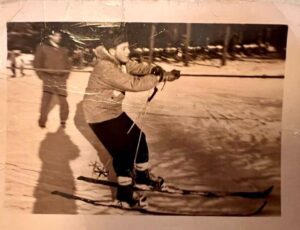
Salesman
Little Carminuze proved to be a gifted salesman. To make extra money, he and his lifelong best friend Al Marra sold flower and vegetable seeds they bought from a catalog door to door. Later, they graduated to selling fire extinguishers to bars and restaurants, punctuating their sales pitch with a fiery demonstration. He also found a job making chicken deliveries for a relative who owned a small slaughterhouse. Deliveries were supposed to be free but one day, frustrated with his low wages, little Carmen decided to add a delivery surcharge to his orders, unbeknownst to his boss. He then treated himself to a milkshake with his windfall, but alas, his boss found out and Carmen was forced to issue apologies to the aggrieved customers and (eventually) refund their money.
A local priest recruited Carmen to attend Bishop Duffy, a new high school in Niagara Falls, in 1946. But there was a misunderstanding about the tuition–Carmen thought it would be free, but a week into his freshman year he was called down to the principal’s office because they’d sent a tuition bill to his father but Carmelo refused to pay.
All his other children went to public schools, and Carmelo didn’t see any reason why Carmen couldn’t do the same. A compromise was reached–Carmen got to attend Duffy tuition free in exchange for selling ad space for the yearbook. It turned out to be a useful skill that later led to jobs at The Niagara Gazette, and later at The World Telegram & Sun in New York.
Carmen found a profitable racquet in smuggling cigarettes across the border and then re-selling them at a markup in Ontario, where smokes were more heavily taxed. Once though, they got caught and a priest from Bishop Duffy had to bail them out of a Canadian jail, or so Carmen claimed.
One of Carmen’s other early sales jobs in the Falls was selling tours at the Cave of the Winds. His job was to pitch tourists coming off buses. He and other guides amused themselves by inventing ridiculous statistics about the Falls. If one said that one million gallons of water pored over the Falls in a minute, another would say ten million just for fun. It was the aftermath of WW2 and there were still bad feelings about the Japanese. And so, sometimes they’d grab the cameras of Japanese tourists and take lewd photos in the bathrooms with them, just for laughs.
Growing up poor, Carmen learned to be resourceful and to live by his wits. Many of these early sales experiences gave him a lifelong appreciation for con artists and harmless scams. When he graduated from Bishop Duffy in 1950, here’s how his classmates described him in the yearbook. “Carm: business manager, loyal, beautiful smile, handsome, expert salesman, personality plus, cute laugh, good friend.”
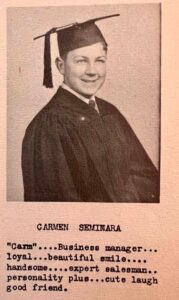
Joanne
Carmen spent a year at Niagara University but was drafted into the Korean War. Unlike those who exaggerate their military careers, Carmen was always candid about his wartime service. “They asked if anyone could type and I raised my hand,” he’d recalled. “I did not want to get killed in Korea.” In the army, he made a lifelong friend in Franz Leichter, whom he shared many adventures with as bachelors in Bangor, Maine, where Carmen sold advertising for the local newspaper, and then in New York City after the war.
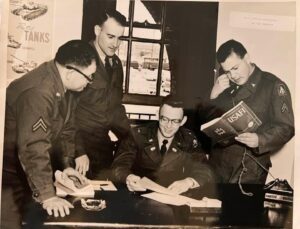
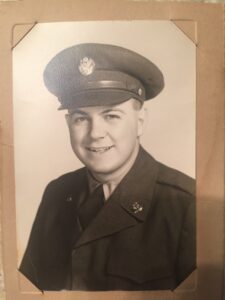
After his stint in the Maine woods, which ended after the newspaper folded, Carmen lived in a bachelor pad on Riverside Drive in Manhattan with a group of his hard-partying friends from Niagara Falls. They had Academy Liquor, which made deliveries in those days and sold on credit, on speed dial. Carmen could still remember their number well into his late eighties. “It was the best liquor store in the world,” he used to say.
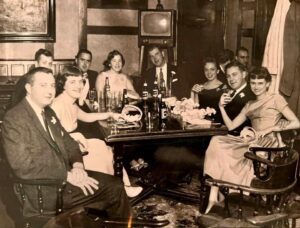
One day in 1957, Carmen and his friends ventured out to the Outer Boroughs, to what he and his friends called The Queens, to help a Falls girl, Kitty Kelly, move into a flat in Woodside on 66th street. One of the residents of the apartment–Joanne Palisano, then a graduate student of social work at Fordham, caught Carmen’s eye. He invited her and the rest of the gang back to his place in Manhattan for a dinner of spaghetti and sauce. “It was the last time he ever cooked for me,” my mother recalls. But it wasn’t their last time dining together–not by a longshot. They would marry by year’s end and enjoyed more than 65 years’ worth of dinners together as a couple.
Joanne says that she and her mother weren’t immediately sold on Carmen as a marriage prospect. “He had a job, but he wasn’t financially stable,” she says. “And I didn’t move to New York city to meet a guy from The Falls.” Carmen and his friends would have Joanne and her friends meet them inside the cinema to avoid paying for their tickets, which cost about 50 cents each at the time. Joanne’s father, Sam, who owned a successful moving and storage business, liked Carmen immediately but Joanne’s mother wasn’t sure. “He wasn’t a doctor or a lawyer and she wasn’t impressed that he didn’t finish college,” Joanne recalls.
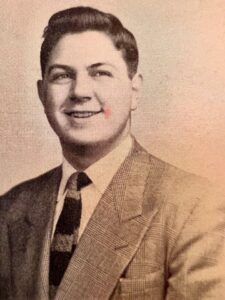
The couple married on November 29, 1958, at St. Mark’s Church in Buffalo, celebrated the occasion at the Buffalo Athletic Club, and honeymooned at the famous Hotel Nacional in Havana, Cuba at a time when Fidel Castro and his band of revolutionaries was in the mountains getting ready to storm the capital. As they checked into the hotel, Carmen gave the bellboys what my mother considered too generous a tip and they quarreled. “You don’t need to throw money around to impress me,” Carmen claimed my mother said at the time. A lifelong gambler, Carmen fled to a casino but thankfully Joanne let it go, and the rest of the honeymoon passed without incident.
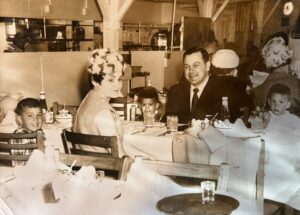
Family Man
The couple got an apartment in the same building on Riverside Drive where Carmen was living with his friends and Joanne left Fordham at her mother’s behest. “My mother said you can’t be married and go to school,” she recalls. “That is my biggest regret, that I never finished my degree.” Carmen and Joanne later moved from the city to Montclair, New Jersey, shortly before Gregory, their first son, was born in 1960. Carmen shifted gears professionally from selling ad space to trucking, taking a job for Boss Linco (and later the Australian company TNT, which bought them out) where he would work for decades. Mark was born in 1961, Paul in 1962, and Peter followed in 1964. The following year, Carmen was elected as a councilman for Franklin Township (NJ). His campaign flyer advertised that he’d promote “industrial growth” and “help New York’s Reform Democrats oust the Tammany bosses.” His bio said that at age 33 he had “risen to sales manager of a major eastern transportation firm” and had “succeeded eminently in every civic task he has undertaken.”
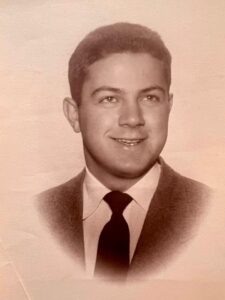
His career in politics didn’t last long. Carmen quickly realized that most of the councilman were corrupt stooges, and he had no interest in trying to cash in on the pay-for-play local politics ethos of the era. Carmen was happy to be a traveling salesman with an expense account. And he was good at his job because his clients loved him.
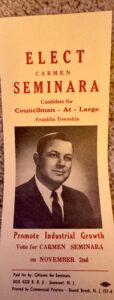
He left town on Tuesday mornings and returned on Thursday nights for decades, and it was a ritual that suited him. On Sundays, Carmen would often drive the family into Manhattan, where they’d have lunch and then explore different neighborhoods on foot. They also owned a travel trailer and would take trips to Cape May and other destinations in the region on weekends.
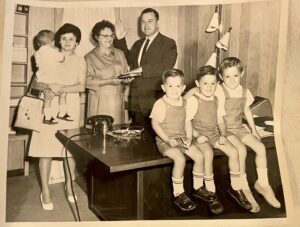
Steven, the couple’s fifth son, arrived in 1966, and I arrived, by accident, in 1972 shortly after they relocated to Williamsville, outside Buffalo, after Carmen was offered a promotion to Vice President of Sales at Boss Linco. Why did Carmen and Joanne have so many kids? “I don’t think we ever had a discussion about how many kids we should have,” Joanne says.
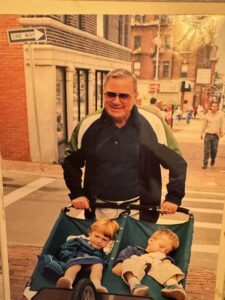
Having six sons may have been a financial burden but having that many kids also had its advantages. Carmen was the breadwinner of the family and he generously supported us. But around the house he was a king. His favorite phrase was “while you’re up.” You could be sound asleep on the couch and he’d say, “While you’re up, go get me a Coke.” I never saw my father cook or clean or rake leaves or do yardwork of any kind. My mom’s job was to cook, clean and manage the money–her frugality explains how they were able to live well on one income–and it was our job to do the other household chores and yardwork. If one of us displeased him with a gross joke or a loud burp or fart at the dinner table, he’d call us a “damned fool” and would send the offending boy into the basement to cool off. Whenever there was a particularly delicious dish or desert, he’d say, only half joking, “that is NOT for children!” Carmen was typically a happy and optimistic person. But he had some unique insults he’d occasionally hurl. Rotten people were “dirty rotten bastards” or “SOBs” and there were others too.
If he had half a brain, it would be lonely.
Go piss up a rope.
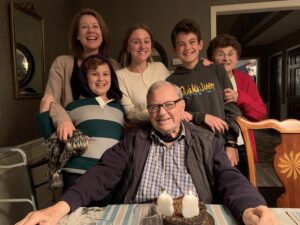
Traveler
Carmen liked to travel; ever curious Joanne loved to travel. “He enjoyed it,” she recalls, “but I was the one who wanted to wake up early to start sightseeing wherever we went.” Italy, especially Gangi, Carmelo’s hometown in Sicily, became a lifelong passion. Quoting his father, Carmen used to call Sicily terra di nobiltà , the land of nobility.
They visited England, Ireland, Finland, Denmark, Sweden, Norway, Spain, Belgium, Portugal, Switzerland, Macedonia, Bulgaria, Greece, The Netherlands, Poland, the Czech Republic, Austria, Russia, Thailand, Japan, China, Singapore, Vietnam, Brazil, Argentina, Colombia, Chile, Cuba, Mexico, South Africa, Zimbabwe, Ecuador, Morocco, Australia, New Zealand, and Egypt. How did they afford all of that on one salary? “We saved. We didn’t go to restaurants. You were the only one who got to go to McDonald’s or Burger King and that was only because your brothers were all gone by then.”
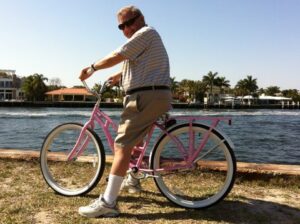
As a business traveler, Carmen was partial to Marriott hotels and treasured his lifetime Platinum membership. He was hopelessly addicted to pilfering hotel soap and shampoo. Carmen and Joanne’s bathroom was a kind of hotel toiletry Fort Knox, illustrating the fruits of their wanderlust. I don’t think they had to buy soap or shampoo for decades. Carmen knew his platinum number by heart and used to frequent a Marriott by his home in Williamsville when he was retired out of habit. Carmen liked to stop by the concierge to pick up newspapers and perhaps a snack and would use their gym too, until he was eventually asked to stop. He once told me that if the concierge at his local Marriott only had copies of USA Today, he would grab a copy and then exchange it for the Wall Street Journal, which was sold in the hotel gift shop.
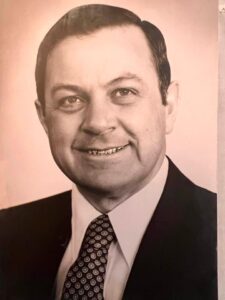
In order to save on travel, and for his own amusement, Carmen printed up business cards for a fictitious travel agency called Sicilian Gold Travel, generously making himself the phantom company’s President and CEO. When he’d check into a hotel, he would introduce himself as a travel agent and ask for an upgrade. It often worked, though sometimes over officious hotel clerks would ask my father for his IATA number. “No, no,” he’d say, “we specialize in cruise consolidation so we’re not an IATA outfit.” With my father’s smile and infectious charisma, no one ever challenged him, and he was never happier than when he’d get a big suite and sometimes a bottle of champagne from a hotel manager.
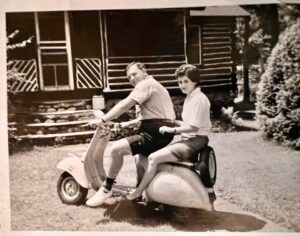
If there was anything wrong with the hotel, or even if there wasn’t, he was frequently able to parlay the hotel’s real or imagined flaws into free breakfasts or other perks. At rental car offices, he discovered that discounts could be had if he complained about the car. “The steering alignment seemed like it was a little off,” was one of his favorites. Carmen was so affable and good natured–even when he was complaining about something–that the employees usually agreed with him.
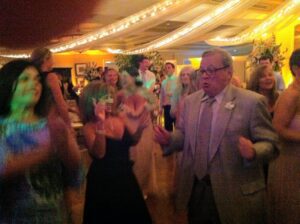
Carmen loved Joanne’s cooking and he loved to eat out too, especially when he could dine on his expense account. If the meal was great, he’d tell every employee in the place how wonderful it was. Sometimes he’d even go back to the kitchen to compliment the chef personally. But if the meal was disappointing or overpriced, he might eat half of it or more and then send it back.
My father was never prouder of me than when I’d tell him about a small scam I pulled he knew I’d learned from him. It could be anything from getting an upgrade to returning something at a store. “That is magnificent!” he’d say and laugh hysterically.
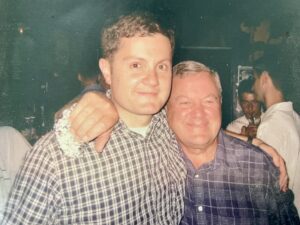
Legacy
Carmen was a man of many interests who enjoyed life’s simple pleasures. He loved to double down in blackjack, he used copious amounts of colognes and after shaves and was into bocce, skiing, tennis and opera. Carmen loved to eat key lime pie and other sweets and insisted that my wife makes the world’s best pizza.He drove company cars most of his life– Cadillacs, Buicks and the like, the bigger the better. Carmen loved the Bills and the Sabres, and spent many hours watching tennis matches with me on television. Our tennis rivalry ended when I was about ten–he disliked me challenging his line calls and my on-court temper.
Carmen treasured his Buffalo rituals for decades–skiing at Kissing Bridge, Holiday Valley and Concord in winter and playing tennis and swimming at Transit Valley Country Club in the summertime. He retired from TNT at 72. Carmen suffered from macular degeneration and, by the time he reached his eighties, typed his emails in ALL CAPS due to his poor eyesight. Aside from travel, Carmen’s focus in retirement was telling stories and living vicariously through the exploits of his 11 grandchildren: Gianna, Isabella, Ciara, Annie, Tommy, Christina, Jack, Sammy, Danny, Leo and James.

There was nothing more important to him than the lives of his children and grandchildren. My brothers feel as privileged to have had him as their dad as I do. “He was really an American success story,” says Greg. “He was very poor, but he didn’t really know it. It’s the classic American dream story that inspires me.” Greg calls Carmen “socially brilliant beyond his means,” and a man who “taught us to be nice to everyone.” “We are all exceptionally good fathers and that is something we learned from his example. What a generational thing that is to pass on,” he said.
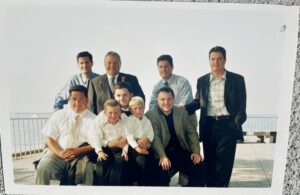
Aside from learning how to be good fathers, Greg also points out that Carmen taught us to be good negotiators. “He would have been so proud that Paul was able to negotiate a discount on his funeral,” Greg says.
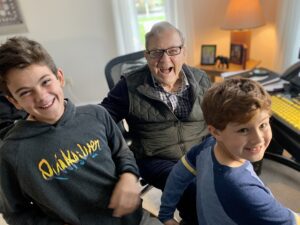
Mark recalls Carmen’s zest for life. “He was a fun-loving guy, always up for adventure,” he says. “He always had that bright outlook; he was always optimistic. He loved to have a cappuccino (from Tim Horton’s) and other simple pleasures.” Mark remembers how Carmen treasured his Italian heritage and his roots in Niagara Falls. “He kept in touch with his friends, he never lost those close connections,” he says. Steve said it all in just a few words: “he was a great dad.” Peter, who died in 2022, learned everything from Carmen and shared many of his best attributes.
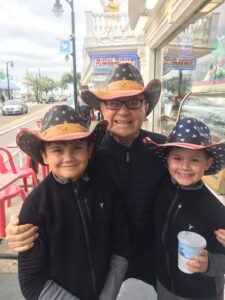
As he lives in Buffalo, Paul was the brother who got to spend the most time with Carmen in his golden years and was a rock for him near the end of his life, when he went blind and suffered from a host of physical and cognitive maladies. He saw how the nurses at Canterbury, the retirement home where Carmen lived, loved him. “They’d all tell me, ‘He’s the sweetest man, he kisses our hands and calls us sweetheart.” “Normally people with dementia are mean but he wasn’t–that’s what they’d tell me,” Paul said.
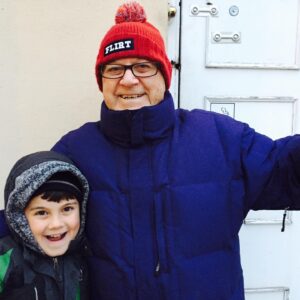
My father and I were kindred spirits and great friends. He valued the fact that I continued to hang out with him as my older brother’s became independent as teenagers and then adults who left the nest. He loved to recount how I got to enjoy “KB burgers” with him while skiing at Kissing Bridge when all my brothers, who wanted to ski with their friends once they became teens, didn’t qualify for by virtue of their independence. “Do you remember our KB burgers, Dave?” he’d often ask me.
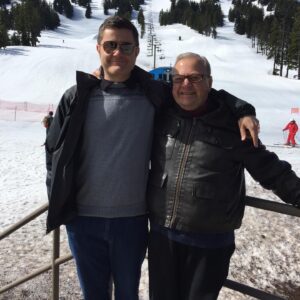
“Enjoy your youth,” my father would often say to me. The aging process can strip a person of their dignity. But even in his greatly diminished capacity, blind and no longer in full command of his faculties and functions, my father was a paragon of strength, optimism and good cheer. He had so much that he could have complained about. His eyesight was gone, his memory and cognitive function was declining rapidly, and there were other indignities that would have turned most people into angry, bitter cranks. But my father didn’t wallow in misery or pity himself.
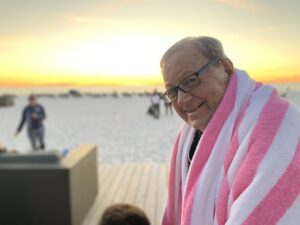
The last day I spent with my dad, in September, was bright and sunny. I wheeled him out into a garden area and parked him in a spot where he could feel the sun on his face. I knew he had been suffering. I knew he had been through a lot. And I knew he didn’t have much time left. I dialed up some vintage Italian music from the 1950s on Spotify and I gave my dad a French vanilla-flavored Boost drink with lots of ice, just how he likes it. As I pressed the straw to his lips and he started to drink, a look of sheer ecstasy washed over his sun-splashed face.
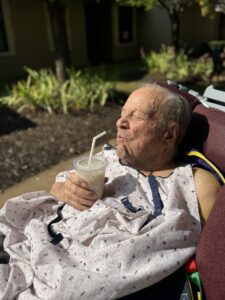
He grabbed one of my hands and said, “This is magnificent!” “Oh my goodness, what a treat, thank you.” I said, “Dad, are you okay, are you in pain?” “I’m fine,” he said. “I have no complaints.” I was humbled and speechless. I’ve long been my dad’s apprentice, but in that moment I knew that I could never be as strong as him, I could never be as fearless, I could never be as optimistic or as indomitable as him. But at least now I know what to strive for. He deserved the auspicious middle name Laura gave him. He never become famous like Julius Caesar, but he was, by any measure, a great man.
The solace we have now is this. Carmen is in a much better place–enjoying the ultimate concierge level and the best upgrade imaginable. Enjoy it dad, you earned it.
Carmen Seminara’s funeral will be on October 19 at 8:45 a.m. at St. Gregory the Great Church in Williamsville, NY. In lieu of flowers, the family has established a scholarship at Canisius High School for students with demonstrated financial need. Donations may be made to https://www.canisiushigh.org/support/gift
From the drop down designation select: In Memory of Carmen J. Seminara
Thank you!

